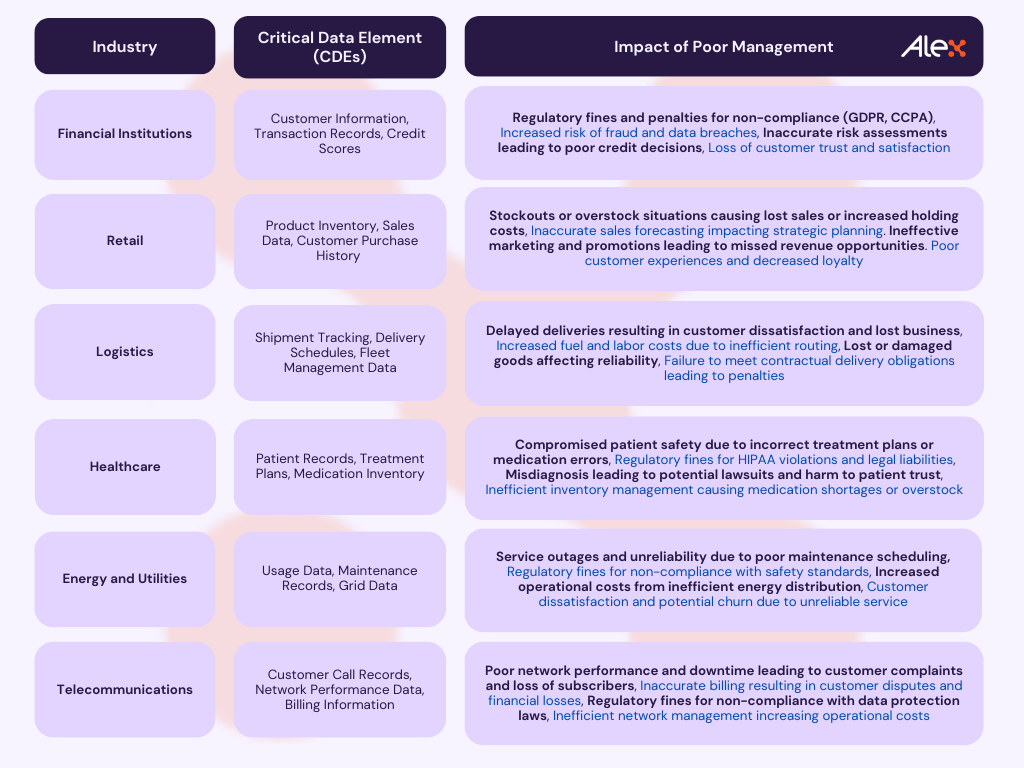What are CDEs?
Critical Data Elements (CDEs) refer to the specific data points that are crucial for an organization’s operations, decision-making, and compliance requirements. These elements are identified and prioritized as part of a data governance strategy to ensure that the most valuable and sensitive data assets are properly managed and protected.
Why do I need to know about CDEs?
With thousands of data sets accumulated within an enterprise, it becomes essential to distinguish which data elements are most critical. This article will provide examples of what CDEs typically include according to their industries.
Understanding and managing CDEs is fundamental for several reasons:
Regulatory Compliance: Many industries have strict regulatory requirements that mandate stringent controls over certain data elements. Identifying CDEs ensures that these elements are adequately governed to meet compliance obligations, thereby avoiding costly fines and legal issues.
Risk Management: CDEs often include data that is critical for risk management. Properly governing these elements reduces the likelihood of data-related risks such as breaches, inaccuracies, and non-compliance, protecting the organization from potential threats.
Operational Efficiency: By prioritizing and managing CDEs, organizations can improve their operational efficiency. Accurate and reliable data supports better decision-making, streamlines processes, and reduces the time spent on data-related tasks.
Enhanced Decision-Making: Reliable and well-managed CDEs provide a solid foundation for business intelligence and analytics. This enables organizations to make informed decisions based on accurate and up-to-date data, driving better business outcomes.
Customer Trust and Satisfaction: Effective CDE management ensures that customer data is accurate, secure, and compliant with privacy regulations. This builds customer trust and satisfaction, which is essential for maintaining a competitive edge.
What are the Challenges of Managing CDEs?
Managing Critical Data Elements comes with its own set of challenges. Here are some scenarios that our team most commonly witness enterprises grapple with today:
Data Volume and Complexity: Enterprises generate and accumulate vast amounts of data from various sources. Identifying and managing CDEs within this sea of data can be a daunting task, requiring robust data governance frameworks and tools.
Data Quality and Consistency: Ensuring that CDEs are accurate, complete, and consistent across different systems and departments is a significant challenge. Poor data quality can lead to incorrect analyses, decision-making and potentially dire consequences.
Data Silos: Data often resides in silos across an organization, making it difficult to achieve a holistic view of CDEs. Breaking down these silos and integrating data across systems is essential for effective CDE management. However, it can be an incredibly time consuming and manual process to bring teams together to achieve this.
Compliance Requirements: Keeping up with evolving regulatory requirements and ensuring that CDEs comply with these regulations is a continuous challenge. Non-compliance can result in severe penalties and damage to the organization’s reputation. More on this in the table below.
Data Security and Privacy: Protecting sensitive CDEs from breaches and unauthorized access is crucial. Implementing robust security measures and maintaining compliance with data privacy regulations is essential to safeguard critical data.
Resource Allocation: Effective CDE management requires dedicated resources, including skilled personnel and advanced tools. Ensuring that the organization allocates sufficient resources to data governance initiatives can be challenging, especially in resource-constrained environments.
Change Management: As organizations evolve, so do their data needs. Managing CDEs effectively requires adapting to changes in business processes, technologies, and regulatory landscapes, which can be complex and resource-intensive.
Understanding the Impact of Poor CDE Management
Critical Data Elements vary based on the industries. Here is an example of potential CDEs and the impact of poorly managing them by industry.

Discover CDE Management as a Service with Alex
Relying on manual data management can lead to inaccuracies and inefficiencies, which can significantly impact enterprise performance. Alex’s CDE Management as a Service, supported by our Enterprise Data Governance Catalog and expert implementation team, offers a powerful solution to overcome the challenges and avoid the costs associated with poorly managed CDEs listed above.
🚀 Experience a personalized demo today: Chat with our team about how Alex Solutions can transform your data management approach.




